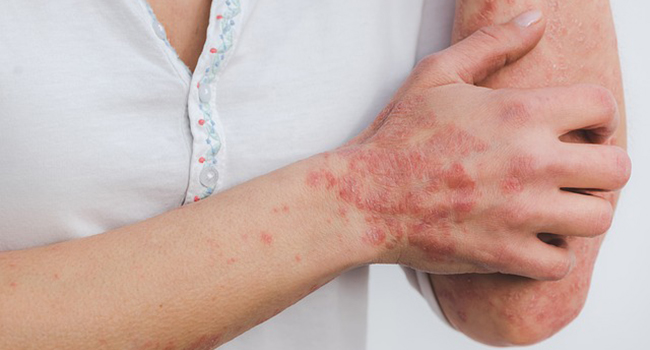
Plaque psoriasis is a chronic skin condition that causes the skin to become red, thick, and scaly. It is the most common type of psoriasis, accounting for about 80% of all psoriasis cases. Plaque psoriasis occurs when the immune system mistakenly attacks healthy skin cells, causing them to grow too quickly and build up on the surface of the skin. This leads to the formation of thick, silvery scales and red patches on the skin that can be itchy, painful, and can crack and bleed.
Severe plaque psoriasis is characterized by extensive skin involvement, covering more than 10% of the body surface area, and can significantly impact a person's quality of life. It may require more aggressive treatment options, including systemic medications, to control symptoms and prevent complications.
Clinical Trial
Deucravacitinib, an oral, selective, allosteric tyrosine kinase two inhibitor, is a new psoriasis treatment evaluated for efficacy and safety in adults with moderate to severe plaque psoriasis. The study was a 52-week, double-blinded, phase 3 trial that compared deucravacitinib with a placebo and apremilast. The primary endpoints were response rates for ≥75% reduction from baseline in Psoriasis Area and Severity Index (PASI 75) and static Physician's Global Assessment score of 0 or 1 (sPGA 0/1) with deucravacitinib versus placebo at week 16.The results showed that at week 16, response rates were significantly higher with deucravacitinib versus placebo or apremilast for PASI 75 and sPGA 0/1. Moreover, the drug's efficacy improved beyond week 16 and was maintained through week 52. Adverse event rates with deucravacitinib were similar to those with placebo and apremilast, indicating that the patients tolerated it well.
The study suggests that deucravacitinib is an effective and safe treatment option for patients with moderate to severe plaque psoriasis. The drug showed superior efficacy to placebo and apremilast across multiple efficacy endpoints.
Conclusion
In conclusion, the study provides evidence that deucravacitinib is a promising new treatment for psoriasis that may benefit patients seeking effective, well-tolerated oral psoriasis treatments. Further studies may be needed to explore the long-term safety and efficacy of deucravacitinib in a more diverse patient population.__________
National Library of Medicine, Jan-23
ClinicalTrials.gov NCT03624127
About Atopic Dermatitis
Breakthrough Treatment for Eczema and Psoriasis
Sitagliptin plus Phototherapy, A Promising Treatment for Psoriasis
Trial finds Deucravacitinib is Effective For Moderate to Severe Plaque Psoriasis
Investigational Drugs bring hope to those suffering from Psoriasis
Netakimab Clinical Trial reveals its efficacy for treating Psoriasis
Can Eczema Medication given to Children cause Cancer?
Are You Concerned About Eczema? See What Doctors Say!
Combining Two Medications Shows Promising Results in Treating Atopic Dermatitis
Managing Pruritus in Atopic Dermatitis with Ruxolitinib Cream
Is Rocatinlimab Safe and Effective for Treating Moderate-to-Severe Atopic Dermatitis?
Drug shows Efficacy against Contact Dermatitis
ClinicalTrials.gov NCT03624127
About Atopic Dermatitis
Breakthrough Treatment for Eczema and Psoriasis
Sitagliptin plus Phototherapy, A Promising Treatment for Psoriasis
Trial finds Deucravacitinib is Effective For Moderate to Severe Plaque Psoriasis
Investigational Drugs bring hope to those suffering from Psoriasis
Netakimab Clinical Trial reveals its efficacy for treating Psoriasis
Can Eczema Medication given to Children cause Cancer?
Are You Concerned About Eczema? See What Doctors Say!
Combining Two Medications Shows Promising Results in Treating Atopic Dermatitis
Managing Pruritus in Atopic Dermatitis with Ruxolitinib Cream
Is Rocatinlimab Safe and Effective for Treating Moderate-to-Severe Atopic Dermatitis?
Drug shows Efficacy against Contact Dermatitis
